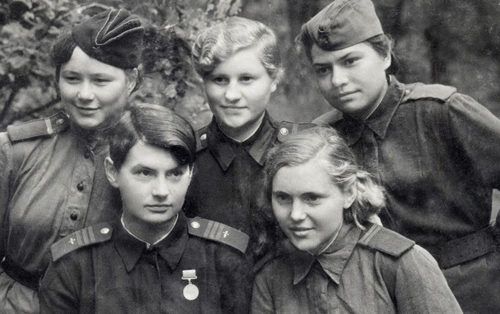
The “Night Witches” were a regiment of daring female fighter pilots in the Soviet military who played a crucial role in the Allied victory against Nazi Germany.
The unit was formed by Marina Raskova, aka the “Soviet Amelia Earhart.” Maria was the first female navigator in the Soviet Air Force and held many long-distance flight records. She traveled all over the USSR and everywhere she went, she was approached by women who wanted to fight Nazis. Watching the German aggressors kill their brothers and husbands and destroy their homes and villages made these brave Russian women want to do more for their country than knit sweaters. They were determined to fight.
Marina used her personal contacts to get a message to dictator Joseph Stalin, asking for permission to form a women’s fighting battalion. Stalin immediately issued orders to deploy three all-female air force units and create the all-female 588th Night Bomber Regiment. The women’s mission would not be to drop bombs, but only to return fire. The Soviet Union was the first country to allow women on the front lines of battle.
As soon as the new plan was announced, thousands of women submitted applications for 1200 positions – four hundred for each of the three units. The women ranged in age from 17 to 26, and were mostly students. Those selected for this dangerous job moved to Engels, a small town near Stalingrad, to train at the Engels School of Aviation. There was no time to spare and the women learned in a few months what most airmen take several years to understand. Each woman had to be trained and fully prepared to fill four roles: pilot, navigator, maintenance, and ground crew. They faced mockery and harassment from male soldiers and officers.
The women of the 588th received bargain bin equipment. The military had to outfit them on the sly, giving them hand-me-down male uniforms to wear, including boots that were so large they had to stuff them with rags. Their planes were primitive 20 year old crop dusters made of wood and canvas, providing no shelter from the harsh elements. Flying at night in the Soviet winter, the female aviators endured sub-zero temperatures, fierce winds, and even frostbite. The planes were too light to carry parachutes, radar detectors, radios, or guns. Instead they navigated with low-tech items such as maps, compasses, flashlights, watches, rulers, and pencils – which doubled as eyeliners. They were fierce fighters, but they found ways to add a feminine touch, wearing makeup and putting flowers in their planes.
Each plane could only carry two bombs at a time, one under each wing. Every night, the regiment sent out 40 two-person crews. They flew 8-18 missions each night. The flimsy planes struggled under the heavy load of bombs, and they had to fly at very low altitudes, making them easy to shoot down. This danger is why the 588th Regiment flew only at night.
Each unit had a nightly routine – the first plane would go in as bait to attract German spotlights, which illuminated the path for the other planes. The next plane would release a flare to light up the target. Then the last plane came in, idled its engine and swooped in silently for the kill. Germans called them Nachthexen (night witches) because the whooshing sound their primitive wooden planes made sounded like a sweeping broom. This eerie sound was the only warning Germans had that the fearless women of the 588th were about to attack; the planes were too small to show up on radar.
The Nazis were so threatened by the Night Witches that any German soldier who killed one was automatically awarded the prestigious Iron Cross.
The fearless Night Witches flew over 30,000 missions over the next four years, dropping 23,000 tons of bombs on advancing German armies. They lost 32 pilots including sadly Marina Raskova. She died on January 4, 1943 when her plane was shot down heading to the front line. She received the first state funeral of World War II and her ashes are buried in the Kremlin. Twenty-four of the fliers were honored as “Hero of the Soviet Union.”
For flying into battle with primitive equipment to defeat the Germans, we honor the 1200 brave women of the 588th Night Bomber Regiment, led by as this week’s Thursday Heroes.
Get the best of Accidental Talmudist in your inbox: sign up for our weekly newsletter.